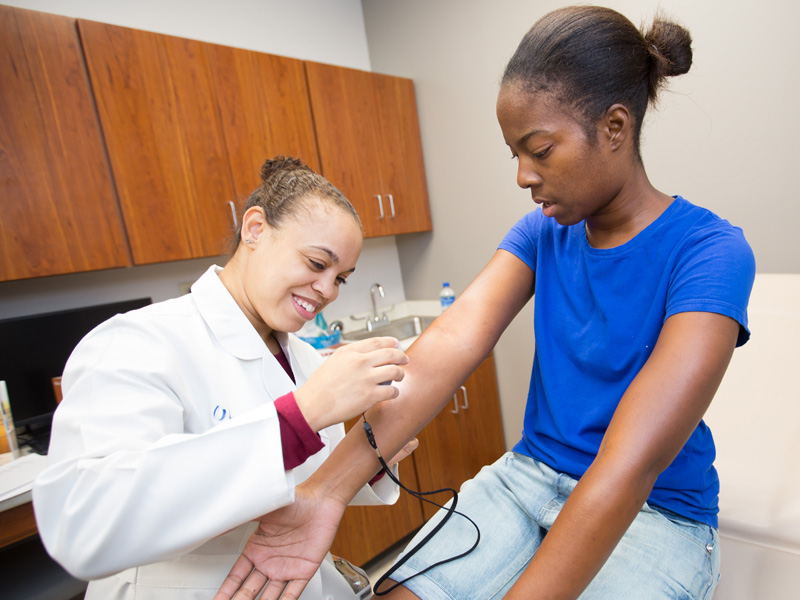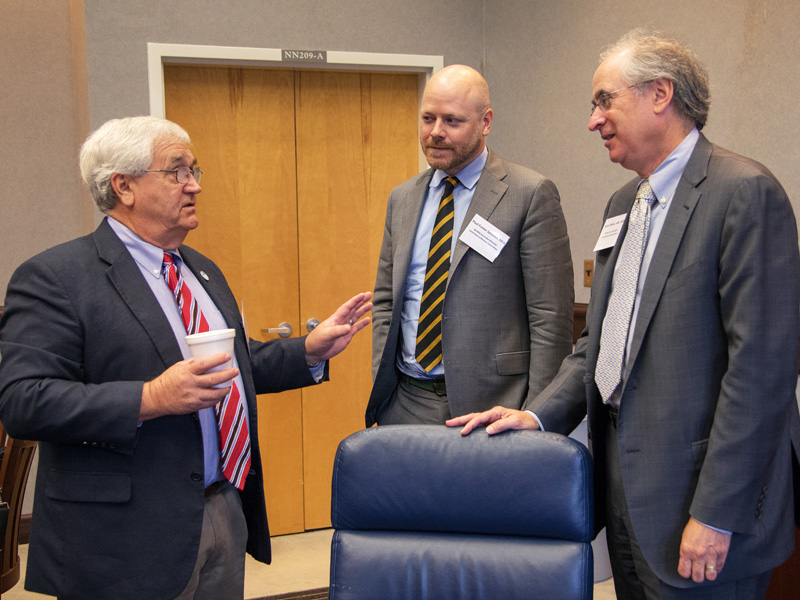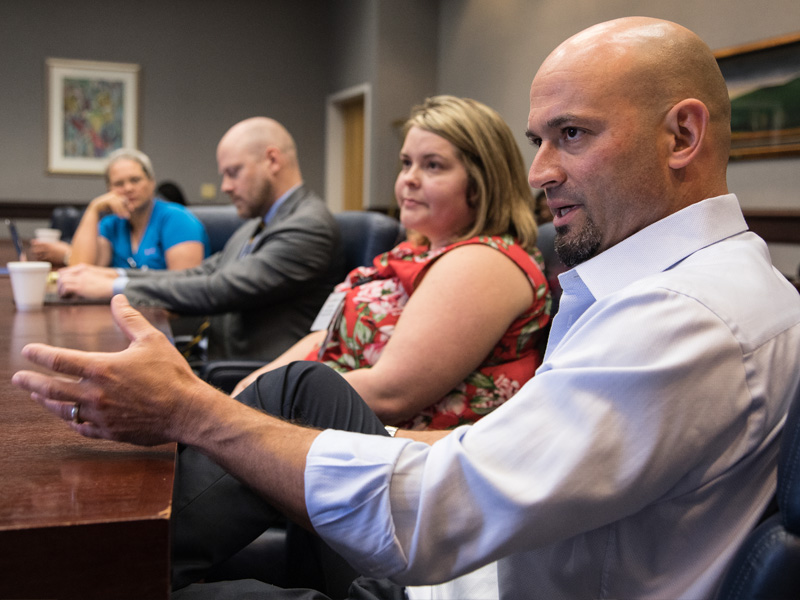More physician residencies mean more access for state's rural patients

Mississippi’s shortage of practicing physicians is dire, with too few in rural areas compared to the workforce in urban communities.
Class sizes at the University of Mississippi School of Medicine and William Carey University’s School of Osteopathic Medicine are growing, but that’s not enough to meet demand any time soon. More solutions are needed at a time when Mississippi has just 64.4 active primary care physicians per 100,000 population, with a U.S. state median of 90.8.
One answer is already in the works: Increasing the number of physician residencies around the state, with the hope that those caregivers will put down roots in the communities where they completed that phase of their medical education.
“Mississippi has been last in physicians per 100,000 population for many years,” said Dr. John Mitchell, UMMC associate professor of family medicine and director of the Office of Mississippi Physician Workforce. The office advocates for creation of residencies, both at UMMC and statewide.
“The need for additional postgraduate medical training sites has been a need for several years as well, but with the addition of William Carey University School of Osteopathic Medicine and the increasing class size at UMMC, the need has been magnified,” Mitchell said.
A new initiative spearheaded by the Accreditation Council for Graduate Medical Education, or ACGME, is specifically addressing the dilemma. The ACGME work group to facilitate GME accreditation within medically underserved populations is looking at physician needs in rural and urban underserved areas nationwide.
Members of the work group also are brainstorming on what ACGME can do in terms of a framework for accreditation that might facilitate resident training in underserved areas and retention of physicians in those areas to better meet patients’ needs.

The Office of Mississippi Physician Workforce recently hosted the work group on the UMMC campus. Through small-group discussions, an assembly that included physicians, residents, hospital presidents, state legislators, former hospital CEOs, graduate medical education program directors, and UMMC and William Carey leaders offered suggestions and strategies for solving the shortage.
State Rep. Sam Mims of McComb, chairman of the Mississippi House Public Health and Human Services committee, authored the bill creating the Office of Mississippi Physician Workforce in 2012. Mims offered members of the work group his perspective on that legislation and how it will benefit Mississippi for years to come.
Local health systems are making contact with current or prospective medical students and encouraging them to practice there, Mims said. “They understand that if they can have physician residencies around their health system, then those people might want to stay in Mississippi and practice. We need to create more of those positions in Mississippi and to take care of our citizens.”

“Many communities in urban and rural areas are currently experiencing physician shortages that are projected to worsen if action is not taken to optimize the number and distribution of physicians in practice,” said Paul Johnson, ACGME executive director, Institutional Review Committee. “The availability of a sufficient number of physicians to meet the needs of patients is associated with efficient healthcare utilization, lower healthcare costs, prevention of deaths, and better health outcomes.
“In fulfillment of ACGME’s mission ‘to improve health care and population health,’ the anticipated (accreditation) framework will include opportunities to address health and healthcare disparities and inequities in medically underserved areas by facilitating the development of ACGME-accredited programs,” Johnson said.
“Because we’re at such a critical shortage of physicians, we’re looking at ways to expand residency slots so that we can train more physicians and retain them,” said Dr. Katie Patterson, a family physician in Indianola who serves as chairman of the Mississippi Office of Physician Workforce advisory board and executive committee.
“We need a doctor for every person in the state of Mississippi. We need to create residency programs in the communities where we need them most,” Patterson said.

The Office of Mississippi Physician Workforce was formed to help find solutions not just for the shortage of practicing physicians, but their distribution across the state as well. “One of the ways we have attempted to address that is by the creation of new ACGME residencies across the state,” Mitchell said. “Although we’re not close to completing our goals of adding the residencies over the state, we’ve made some significant progress.”
Part of the problem is that residencies are concentrated in the state’s urban areas that aren’t experiencing such a critical shortage. “Right now, we’re training more physicians in this state than we have residency slots,” Patterson said. “Studies show that residents stay within 30 to 50 miles of where they are trained.”
She’s an exception to that trend, though. “I trained in Texas, but I came home,” Patterson said. “This is where my people are. There are some people who are driven by that who come home, but we want to give more people every opportunity to stay here.”
How to fund new residencies and in what specialty to create them, however, is complex. The number of slots in a residency program is reviewed by the ACGME Review Committee, and hospitals must come up with the money to pay a resident’s salary and benefits.
The Medical Center employs about 630 residents and fellows representing 63 programs, with all of those programs accredited by the ACGME. An additional three residency programs in the School of Dentistry and one in neurocritical care are accredited by bodies other than the ACGME, said Bryce Ainsworth, a project manager in the School of Medicine’s Office of Graduate Medical Education.
Salaries alone for those physicians total about $33 million annually, with the Medical Center paying about $28 million of the cost and the remainder covered by grants and other outside funding.
One model that can be successful is to create new residency programs instead of adding to existing ones, Patterson said. Examples are residencies created to bring family physicians to Rush Hospital in Meridian, North Mississippi Medical Center in Tupelo, and Forrest General Hospital in Hattiesburg.
Internal medicine residencies also have been created at Baptist Hospital in Columbus, Magnolia Regional in Corinth and Merit Health in Hattiesburg, along with an emergency medicine residency at Merit Health in Hattiesburg and one soon to begin at Magnolia Regional in Corinth, Mitchell said.
“The Office of Mississippi Physician Workforce is working on a model for the Delta and other spots in the state not only for family medicine physicians, but for specialties such as psychiatry,” Patterson said. “We’re working in the Delta on a model for a consortium of several hospitals to join together, share expenses and make residency programs there sustainable.”
“I believe firmly in access to care,” Mims said. “We have to look at ways to continue attracting physicians to Mississippi. Once they come here, they stay and enjoy it, and realize it’s a good place to live.”


